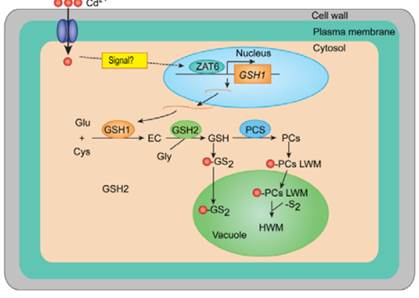土壤耐受重金属毒害关键基因找到
来源:《Plant Physiology》
作者:Jian Chen等
时间:2016-04-19


土壤重金属污染是全球性的重要环境问题之一,被污染土壤中的重金属可被农作物吸收进入食物链,严重影响食品安全并危及人类健康。植物修复基因工程是解决土壤重金属污染的重要途径之一,其中,寻找和发掘耐受重金属毒害且调控重金属超量积累的关键基因并阐明其作用机理,是植物修复基因工程获得成功并从源头上控制农产品食品安全的关键。近日,合肥工业大学曹树青教授课题组的相关研究成果在线发表在国际植物学著名期刊《植物生理》上。
该研究利用正向遗传学途径筛选鉴定了一个拟南芥耐镉突变体,利用生物技术克隆了相应的突变基因,发现该基因编码一个转录因子ZAT6,它可以特异性地直接结合到控制谷胱甘肽,即植物螯合素的合成前体物,合成的一个关键基因的启动子上,并协调激活谷胱甘肽依赖的植物螯合素合成途径上的相关基因表达,从而增加植株体内植物螯合素的合成,最终提高植株对镉的积累和耐受。
“因此,可利用过量表达ZAT6转基因技术增加植物对镉的积累和耐受性,为土壤重金属污染植物修复基因工程提供了新的基因资源和技术途径。”曹树青说,该基因及其在土壤镉污染修复中应用已获得自主知识产权,可在其他生物量大的植物上推广并产业化利用。(来源:科技日报)
Zinc-Finger Transcription Factor ZAT6 Positively Regulates Cadmium Tolerance through Glutathione-dependent Pathway in Arabidopsis
Abstract Cadmium (Cd) is an environmental pollutant with high toxicity to animals and plants. It has been established that the glutathione (GSH)-dependent phytochelatin (PC) synthesis pathway is one of the most important mechanisms contributing to Cd accumulation and tolerance in plants. However, the transcription factors involved in regulating GSH-dependent PC synthesis pathway remain largely unknown. Here we identified an Arabidopsis Cd-resistant mutant xcd2-D (XVE system-induced cadmium-tolerance 2) using a forward genetics approach. The mutant gene underlying xcd2-D mutation was revealed to encode a known zinc-finger transcription factor ZAT6. Transgenic plants overexpressing ZAT6 showed significant increase of Cd tolerance, whereas loss-of-function of ZAT6 led to decreased Cd tolerance. Increased Cd accumulation and tolerance in ZAT6-overexpressing lines was GSH-dependent, and associated with Cd-activated synthesis of phytochelatin (PC), which was correlated with coordinated activation of PC-synthesis related gene expression. By contrast, loss-of-function of ZAT6 reduced Cd accumulation and tolerance, which was accompanied by abolished PC synthesis and gene expression. Further analysis revealed that ZAT6 positively regulates the transcription of GSH1, GSH2, PCS1 and PCS2. But ZAT6 is capable of specifically binding to GSH1 promoter in vivo. Consistently, overexpression of GSH1 has been shown to restore Cd sensitivity in the zat6-1 mutant, suggesting that GSH1 is a key target of ZAT6. Taken together, our data provide evidence that ZAT6 coordinately activates PC-synthesis related gene expression and directly targets GSH1 to positively regulate Cd accumulation and tolerance in Arabidopsis.
原文链接:http://www.plantphysiol.org/content/early/2016/03/16/pp.15.01882.full.pdf+html




